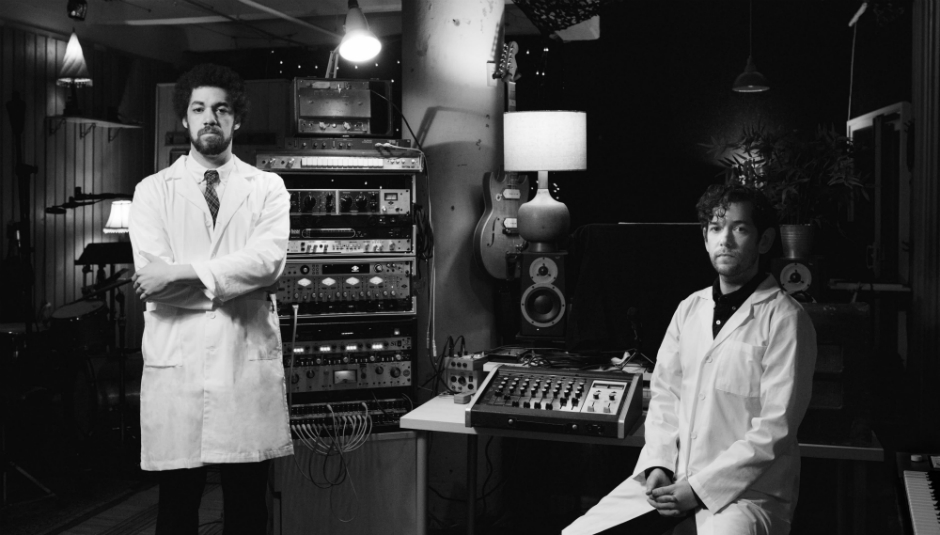Late last year, an intriguing offer ran across Brian Burton’s desk. The man professionally known as Danger Mouse probably receives no shortage of these; since he broke through with The Grey Album in 2004 – his ingenious melding of Jay-Z and The Beatles’ black and white efforts, respectively – he’s been one of the world’s most in-demand producers, working with everybody from U2 and Adele to The Black Keys and Run the Jewels.
Still, this one was a little different. It came from the producers of the Amazon Prime show The Man In The High Castle; for those who missed it over the course of the last year or so’s avalanche of original streaming series, it’s based on the Philip K. Dick novel of the same name and revolves around a dystopian alternative history in which the Axis powers won World War II and split the United States between Japan and Nazi Germany.
Rather than score or directly soundtrack it, Burton was instead invited to compile an accompanying album named after the pirate radio station that features in the second season of the show, which debuted last December – the same month that Burton spent collating the record with the help of collaborator Sam Cohen. By that time, of course, the idea of a divided America in thrall to populism was no longer strictly fantasy. “We picked the songs before the election,” Burton says when he calls from his home in Los Angeles. “But the result was in by the time we started recording, and there was a heavy feeling in the studio that probably fed into things in some way.”
He agreed to the project before the current American reality had been confirmed at the polls, and immediately knew he had to draft in Cohen, the Brooklyn-based former Apollo Sunshine man who produced Kevin Morby’s superb Singing Saw last year and had already been working on his sophomore solo effort with Burton when this opportunity surfaced. “I love conceptual stuff like this, and once I knew I could have creative freedom, I was on board,” Burton recalls. “I can’t compliment Sam enough on his knowledge of sounds and recording. Once I knew he was available to do this, we jumped in, and because we had such a tight deadline – we were only given a month – we both knew it wasn’t going to be something that’d drag on, which suited us.
There was something else that Cohen could bring to the table, too; the show is set in 1962, meaning that the songs they used needed to be from around that point in American history. Cohen’s knowledge of pop music from that time is encyclopaedic. “I felt pretty comfortable with the aesthetics of that era,” he says from his home in New York. “For every project, you’re going to have to do some extensive research, but I’ve listened to that particular kind of music all my life. In that respect, it was never going to be way out of my wheelhouse, so we just spent a long time thinking about song selection, making sure that we got the right ones and didn’t forget about anything.”
The plan quickly fell into place; with their individual connections, the duo were confident of being able to pull together a collection of covers with different vocalists inside the tight timeframe. They picked eighteen tracks, reasoning that it’d give them suitable room for manoeuvre should some of them fail to prove a good match with whoever they could convince to lend their talents. Things went better than they’d hoped – much better. The final album contains all eighteen songs, with seventeen singers – Cohen takes on two tracks himself. The names involved are, without exception, stellar.
“We didn’t go to the bigger artists until later on, when we had a bunch of stuff to show them. We wanted to be able to reel them in by saying, “Look, this is going to be a great album,” explains Burton, who is likely talking about the genuine A-listers on the record; Beck turned in a gorgeous rendition of ‘Can’t Help Falling in Love’, whilst Norah Jones affords similar treatment to ‘Unchained Melody’. “It was nice watching it go on and on, with more and more people saying yes. The same thing happened with the whole quality of it, the production expanding to backing vocals, strings, horns – all these things that we didn’t realise we were going to do, until suddenly we were actually doing it.”
Cohen assembled the backing band in Brooklyn, and along with Burton, they recorded the tracks over the course of just a few days. A handful of the contributing artists cut their vocals in the studio with the key men – Sharon Van Etten swung by in New York to put down her version of ‘The End of the World’, which leads off the album and is Burton’s personal highlight. Once back in LA, meanwhile, he invited Kelis and Karen O to his place to deliver their takes on ‘Who’s Lovin You’ and ‘Living In A Trance’, respectively. More often than not, though, the vocals were being recorded remotely and sent over, from the road or those settled in other cities.
“Michael’s vocals came in from London,” says Burton of Michael Kiwanuka, who delivers a trademark gut-punch with ‘Motherless Child’. “Angel Olsen, who was the only person that neither myself or Sam really knew before we called, she lives somewhere in North Carolina, so that’s where she worked on hers. It was just a case of mixing them so that you couldn’t really tell whether they were done in the studio or elsewhere, and I don’t think you can.”
Still, the mixing wasn’t really the issue as far as authenticity was concerned; the pressing issue was making sure that these songs really sounded genuinely of their time, that they could conceivably have been original recordings of these tracks. Both Burton and Cohen are well-enough versed in production to know that this was always going to involve more than just using old gear or aiming for a lo-fi sound if they were going to pull it off convincingly.
“There are so many huge differences between the way things were done in the fifties and how they are in 2017,” explains Cohen. “Even down to the fact that, so often, these songs would be recorded and released really quickly back then. We knew we needed to aim for something blurrier; the result we wanted was like what you get when you shoot with an old camera, not too crisp and with a lot of texture. We were sonically treating the vocals quite a bit, running them through tube amps and tape echoes to make them feel authentic.”
That the deadline left the pair with so little time to turn the album around actually played to their favour in that regard, because back in the late fifties and early sixties, these kinds of recordings wouldn’t ever really have been laboured over. “Before we fully committed, we did a test run of three songs,” Burton remembers. “We were able to get the right sound straight away, and we knew that the band were good enough – that we’d never have to do more than two or three takes. On top of that, any kind of experimentation or playing around with different palettes wasn’t an option, not just because of time but because that never would’ve happened back then – so right away, that was off the table.”
The key, then, was to think about the album in the wider context of the television show that it’s supplementing; to envision it as part of a period piece, and view the idea of drafting in Benjamin Booker to sing ‘Spoonful’ or Grandaddy to make ‘Love Hurts’ their own in the same way that you would if you’d been the casting director on The Man In The High Castle itself. “If you’re making this kind of show, you’re always going to have to use modern actors,” Burton says. “Everything else, though – the way you set dress, the costumes that come from wardrobe, the language of the script – they’re all going to be trying to make things as accurate as possible for the time period. That’s all we tried to do, and I guess one thing that cropped up when we were deciding on the songs themselves was the fact that this is an alternative reality and it’s a dark one, so that fed into which tracks we ended up choosing. That was a consideration stylistically – that, and making sure we didn’t use any instrumentation that would obviously be out of place.”
As far as the parallels go between that fictional darkness and the present political turbulence in the Western world, it’s fascinating that the title of the record, and the radio station that it’s named after, had been decided upon long before the word ‘resist’ took on such enormous significance in the news cycle, to the point that you wouldn’t be at all surprised if Oxford Dictionaries were to designate it as word of the year once 2017 draws to a close.
That shift has been so dramatic that when Burton, Cohen and the band played a one-off show in support of the album at South by South West back in March, Amazon’s aggressive marketing of it led Trump supporters to threaten a boycott in response, assuming it was an explicit rebuke to the new president. “I think there are probably far more important things to be done in terms of activism than record old sixties songs,” laughs Cohen grimly. “People were making that comparison, though, when we were making the album in December; that it was crazy how, in terms of populism, Trump was president and that it bore resemblance to Hitler coming to power. In terms of the language and setting of the show, the title is something that’s taken on a new meaning.”
Burton and Cohen plan to continue working together now that Resistance Radio is out in the world, even if it’s still winning plaudits; last week, the album was nominated for an Emmy, for Outstanding Creative Achievement in Interactive Media Within a Scripted Program. The latter’s especially tight-lipped on both his forthcoming second solo album and his new projects on the production front. Burton, though, says the process of making the record was transformative. “It made me think about different ways of recording; to do things so quickly, live, with the band in the room. I’ve done that kind of thing before, especially on the Rome album I did with Daniele Luppi, but it’s brought it back into my consciousness quite a bit.”
“More than that, though, I was just thinking about how good these songs are. If you can get the actual songwriting to this level, the recording and the vocals sort of take care of themselves, just like they did for us. That’s affected me ever since; the idea of music that really holds up. The longevity’s in the writing - once you’ve got that, they can live on forever.”
Resistance Radio: The Man in the High Castle Album is out now via 30th Century Records.






















